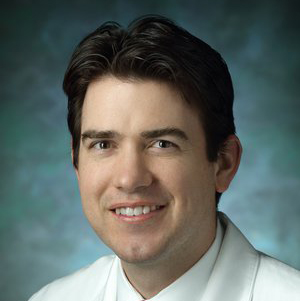Liver Cancer: Answers to Commonly Asked Questions
Featured Expert
Liver cancer in the United States has tripled since 1980 and is becoming one of the most common types of cancer nationally. Worldwide, more than 700,000 people are diagnosed with the disease each year. Richard Burkhart, M.D., a surgical oncologist at The Johns Hopkins Hospital, answers frequently asked questions about liver cancer:
What are the symptoms of liver cancer?
Symptoms of liver cancer include fatigue, jaundice (yellowing of the skin), pain, easy bruising or bleeding, and weight loss.
How can liver cancer be prevented?
Prevention is very important when it comes to a disease like liver cancer. The underlying cause of liver cancer is often liver inflammation and the development of a condition called cirrhosis. In addition to avoidance of drugs and alcohol, infection (such as hepatitis B or C) and obesity can contribute to the development of liver cancer. Steps to minimize these risks include vaccination against hepatitis B for those at risk, prompt treatment for patients infected with hepatitis C, and maintaining a healthy weight through diet and exercise.
How is liver cancer detected?
Patients diagnosed at an earlier stage have better outcomes. There are many strategies that are used to detect liver cancer, including frequent imaging studies (ultrasound, computed tomography scan, magnetic resonance imagining) and routine physical exams with blood testing. Several researchers are looking to find the one blood test that will help identify liver cancer much sooner. Until that time, we continue to remain vigilant and screen with a variety of methods to try to catch this disease as early as possible.
Are fatty liver disease and liver cancer-related?
Patients who have a very specific type of fatty liver disease (progressing to either non-alcoholic fatty liver disease Non-Alcoholic Fatty Liver Disease (NAFLD), non-alcoholic steatohepatitis (NASH), or cirrhosis) are at an increased risk for developing a cancer in the future. However, that does not mean that it will automatically develop into cancer. The diseases are not considered malignant (cancer).
Can primary biliary cirrhosis (PBC) increase the risk of getting liver cancer?
Yes. PBC, which causes inflammation and destruction of bile ducts in the liver, can raise your risk for getting cancer of the liver or biliary tree. I recommend you have a frank, open discussion with your hepatologist about your specific risks, the screening program(s) you are eligible for, and your treatment options.
Are treatments for liver cancer the same as other cancers?
In general, the basic approach of any cancer therapy can also apply to liver cancer. These are:
- The treatment of the local disease. In liver cancer, we often address local disease with either surgery (removal of the tumor or even liver transplantation), radiation therapy, ablation, or catheter-directed therapy.
- The evaluation and treatment of any disease spread. In liver cancer, disease spread is commonly treated with administration of medications via a pill or an IV infusion depending on your doctor's recommendations.
Are herbal medicines recommended to treat liver cancer?
The term 'herbal medicine' can represent thousands of compounds. Unfortunately, most are not rigorously tested or regulated by the companies that produce them, the federal Food and Drug Administration that monitors our drug supply markets, or the physicians that see them in our day-to-day lives.
Some are likely very safe but some may be harmful. I recommend that all patients taking these types of medications discuss them with their physicians as they would any other medication or unregulated drug they may be consuming.
Should I be worried if I have a cyst on my liver?
There is often nothing to worry about with simple cysts in the liver. They can be quite common. When we find cysts that are growing, we will often take extra care to ensure that (1) there is not an associated tumor causing the growth, and (2) that it's not causing problems.This is often discussed over time with your hepatologist and/or surgeon.
Could upper back pain be a sign of liver cancer?
Traditionally we are taught that pain in the right shoulder and back could be due to liver disease, but I would caution you that the list of things that could cause this type of pain is very, very, very long. A patient who is concerned by such pain should seek an appointment with their physician.
If a parent had/has liver cancer, are their children at greater risk of getting it?
In some cases, yes, a parent with liver cancer can raise your personal risk. However, this is not true for the majority of patients. It’s always good to talk to your primary care doctor about your concerns or questions.






